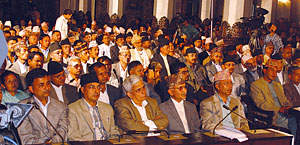|
|
It took the seven party alliance nearly a week to cobble together a skeleton five-member cabinet. But the decisions it took at its first meeting could be harbingers of durable peace. Unlike earlier truce calls since July 2001 (four in all) the latest overture from the government is backed by the people's overwhelming yearning for peace. The regime and the rebels are bound by their 12-point understanding to make this ceasefire really work.
Lack of credible monitoring was the main reason past truces failed. It will be unrealistic to expect that no violation of ceasefire will occur in the coming weeks. In a conflict as widespread as this insurgency, lapses at the local level are bound to occur. But they must not be allowed to wreck the peace process.
Past ceasefires have also meant just an end to confrontations between the warring sides. Ordinary citizens actually suffered more during those ceasefires from extortion, forced recruitment of children, closure of schools and other harassment. Extortion this week has hit a peak in Kathmandu, with a paediatrician actually shot in broad daylight for refusing to give in to extortion. The Maoists better reign in their cadre if they want to retain their credibility.
One man's extortion is another man's donation, but the comrades don't even try to hide that money collected is used for support of the rank and file. If the rebels don't have this source of funds, short-term arrangements have to be made so they don't force it from the people.
The movement of armed guerrillas, security of off-duty soldiers, mutually acceptable limits on expansion and arms procurements, and a moratorium on incendiary speeches are other pressing issues that need attention from the new peace cabinet.
Perhaps it's a little early to talk about demobilisation, rehabilitation or reintegration of guerrillas. But that goal needs to be kept in sight while designing the framework of a workable ceasefire. A truce is too serious an issue to be left just to the government and insurgents. Civil society and the international community must immediately use their leverage to get the warring sides to use the present ceasefire for peace-building.



